S.Africa's Ramaphosa Leads Tributes To 'Fallen' Zulu King
South African politicians, traditional leaders and celebrities gathered Thursday to bid farewell to Zulu king Goodwill Zwelithini, with tributes led by President Cyril Ramaphosa, who declared "a huge tree has fallen."
The leader of South Africa's largest ethnic group, who died of illness last week, was laid to rest overnight.
The burial, referred to as a "planting" in Zulu culture, was conducted by a select group of men in a private ceremony at his palace.
VIPs in face masks gathered in the small southeastern town of Nongoma, in KwaZulu-Natal province, for a memorial service in a carpeted marquee set up on the front lawn of the king's royal residence.
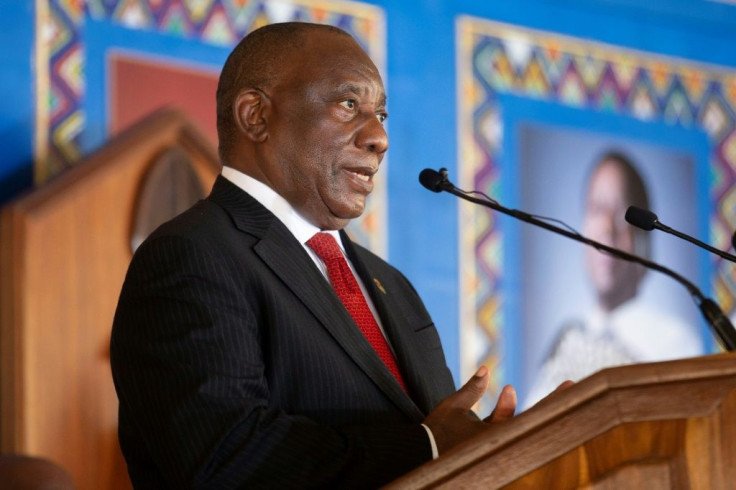
Guests sporting a variety of black dress and traditional attire included ex-president Jacob Zuma, the newly-elected Confederation of African Football president Patrice Motsepe, and Princess Charlene of Monaco.
South Africa's embattled power provider Eskom suspended a week of rolling blackouts for a few hours to allow people to follow the ceremony on television.
"We are bidding farewell to our leader," Ramaphosa said, remembering Zwelithini as a "staunch defender of his people" who "valued diversity" and respected other cultures.
"It is a difficult day because a huge tree has fallen."
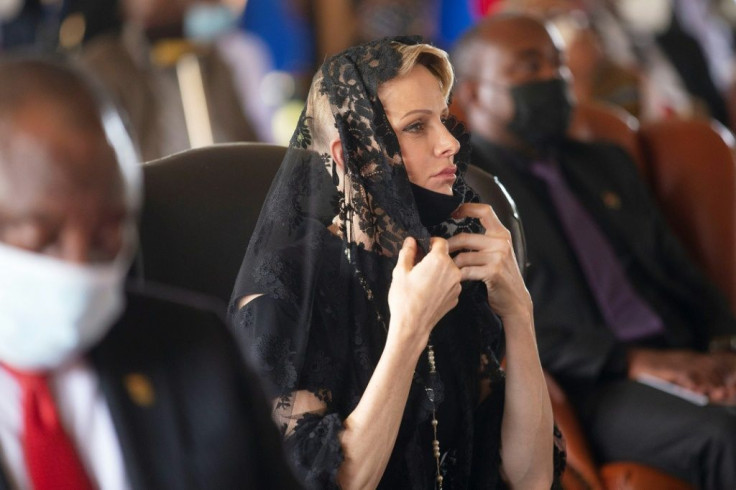
Zwelithini's six widows sat in the front row, bowed heads covered in thick black lace.
Giant portraits of the king in traditional leopard skin hung on a blue panel behind the wooden altar where an Anglican priest led the ceremony, overlooking a line of red carnations.
Both the main marquee and a secondary tent were filled to the brim. Dozens of guests spilt out onto the lawn and stood under trees.
A nurse circled through the crowd offering sprays of hand sanitiser.
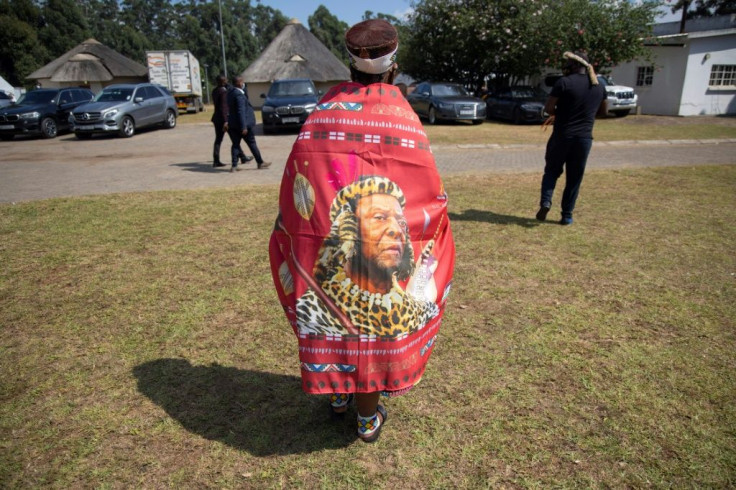
Zwelithini was the longest-serving monarch in Zulu history, reigning for half a century through years of apartheid and the transition to multi-racial democracy.
He died early on Friday in the eastern city of Durban, aged 72, after weeks of treatment for a diabetes-related illness.
Ramaphosa hinted that Zwelithini was also battling Covid-19 at the time of his death.
"Our beloved leader and king... succumbed to the deadly disease that has taken the lives of so many people," he said, without naming the virus.
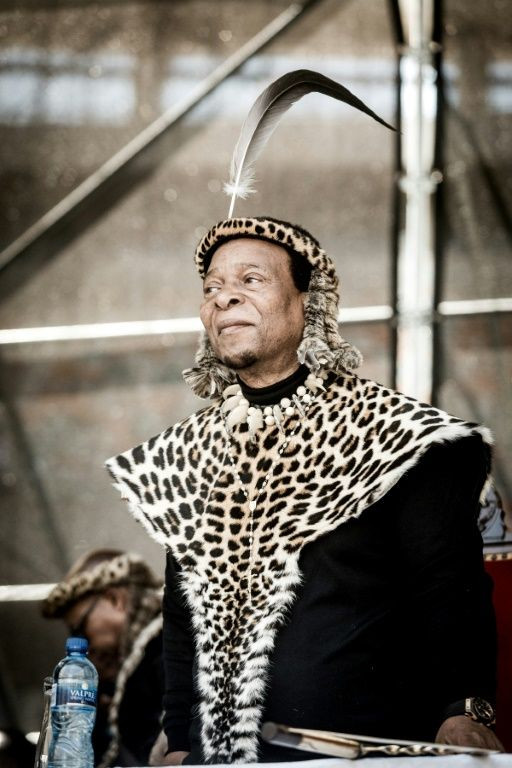
The president switched between English and Zulu during his speech, honouring the most-widely spoken of South Africa's dozen official languages.
There are more than 11 million Zulus in South Africa, nearly a fifth of the country's population.
Although Zwelithini's title did not bestow executive power, he had moral clout over his people.
Hundreds of Zulu mourners had paraded through the small southeastern town of Nongoma on Wednesday to bid their monarch a final farewell.
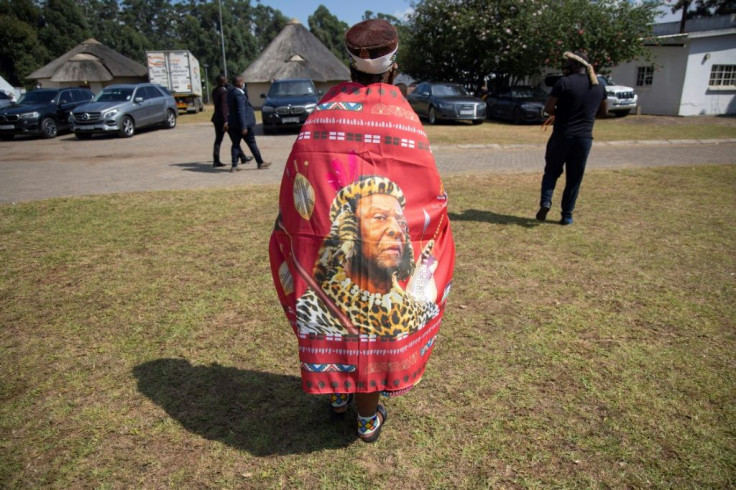
They gathered again in front of the palace ahead of the memorial service.
Men known as "amaButho", or Zulu regiments, wore leopard skins over their chest and carried shields made of animal hide.
Women sported elaborate bead necklaces and multi-coloured headbands, bracelets jangling around their wrists. Some had adorned their hair with porcupine quills.
A group of bare-breasted young women in red skirts and face masks danced and sang on a sunny patch of grass outside the palace gates.
"We don't have a choice but to be here to plant our king," said artist Nxumalo Gadla, singer of a Zulu folk music genre known as "maskandi."
"It's a first in our lifetime to lose a king."
Zwelithini ascended to the throne during apartheid in 1971, becoming the eighth Zulu monarch aged only 23.
As the most influential of traditional leaders, he advised legislators and met with powerful politicians throughout his rule.
The king was praised for attacking AIDS myths in a country battered by the HIV pandemic, which was particularly pronounced in KwaZulu-Natal.
A descendant of lauded Zulu kings -- including the all-powerful Shaka -- he revived the annual Reed Dance in 1984, where thousands of young women celebrate their virginity by dancing in front of their monarch.
"He did it out of love," said 24-year-old "maiden" Nhlanhla Magwaza, who travelled from the neighbouring town of Ulundi to pay her respects.
Charismatic and sharp-tongued, Zwelithini was also divisive.
During the twilight of white-minority rule in the 1990s, the Zulu nation was accused of playing into the hands of the apartheid system's fight against the then-banned African National Congress party.
Zwelithini later gained international notoriety for anti-foreigner remarks blamed for inflaming a spate of xenophobic attacks on mostly African immigrants.
He also sparked a storm in 2012 when he slammed same-sex relationships as "rotten," drawing rebuke from rights groups.
The king would ordinarily be succeeded by the eldest son born to the senior of his wives, with whom he sired 28 children.
Local historian Khaya Ndwandwe said it could take two years for the chosen successor to take over.
"There are some rituals that have to be performed," he explained, including "cleansing" the wives and palace and slaughtering cattle.
© Copyright AFP 2024. All rights reserved.





















